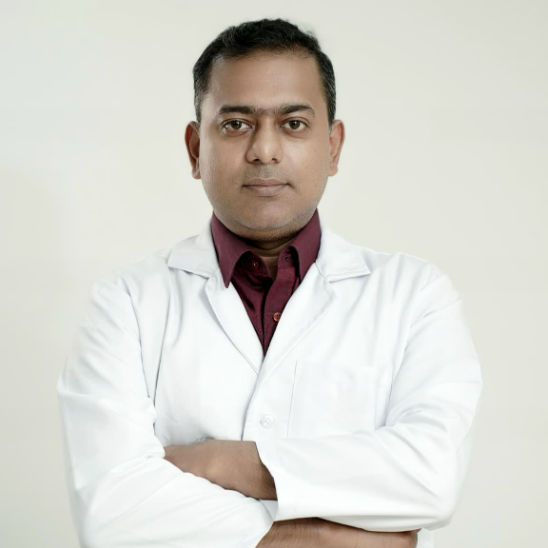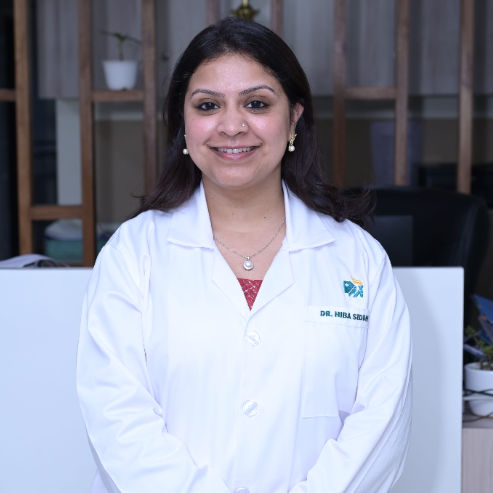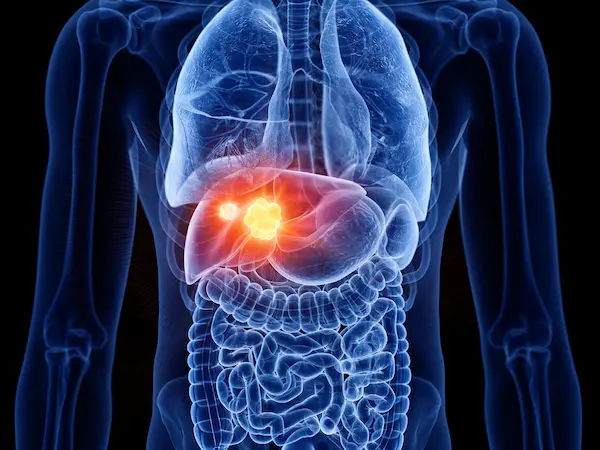Adenocarcinoma Overview: Causes, Types, Symptoms, Treatment
Know about the Adenocarcinoma, causes, types, symptoms, treatment, diagnosis, treatment, management, and lifestyle tips for the adenocarcinoma.

Written by Dr. Rohinipriyanka Pondugula
Reviewed by Dr. J T Hema Pratima MBBS, Fellowship in Diabetes Mellitus
Last updated on 13th Jan, 2026

Introduction
If you have been diagnosed with adenocarcinoma, you may have questions about what it means and how to manage it. This article will help you understand adenocarcinoma in simple terms, what it is, its causes, symptoms, and available treatments.
What Is Adenocarcinoma?
Adenocarcinoma is a type of cancer that starts in the glandular cells (cells that produce mucus or other fluids) of the body. These cancers can develop in different organs, including the:
- Lungs (the most common type of lung cancer)
- Breast (a common form of breast cancer)
- Prostate (most prostate cancers are adenocarcinomas)
- Colon & Rectum (most colorectal cancers are adenocarcinomas)
- Pancreas
- Stomach
- Esophagus
Since adenocarcinoma arises in glandular tissues, it can spread to other parts of the body if not treated early.
Consult an Oncologist for Personalised Advice
What Causes Adenocarcinoma?
The exact cause of adenocarcinoma is not always clear, but several risk factors increase the chances of developing it:
1. Smoking & Tobacco Use
- Strongly linked to lung and oesophageal adenocarcinoma.
2. Family History & Genetics
- If close relatives have had cancer, your risk may be higher.
3. Age
- Most cases occur in people over 50.
4. Chronic Inflammation or Infections
- H. pylori infection (stomach cancer)
- GERD (acid reflux) (oesophageal adenocarcinoma)
5. Obesity & Poor Diet
- High-fat, low-fibre diets may increase colorectal cancer risk.
6. Exposure to Harmful Chemicals
- Asbestos, radon, and certain industrial chemicals can contribute.
Types of Adenocarcinoma
Since adenocarcinoma can develop in different organs, the types are classified based on their location:
1. Lung Adenocarcinoma – Most common type of lung cancer in non-smokers.
2. Breast Adenocarcinoma – Forms in milk ducts or lobules.
3. Prostate Adenocarcinoma – Nearly all prostate cancers are this type.
4. Colorectal Adenocarcinoma – Affects the colon or rectum.
5. Pancreatic Adenocarcinoma – Often aggressive and hard to detect early.
6. Gastric (Stomach) Adenocarcinoma – Linked to diet and infections.
Symptoms of Adenocarcinoma
Symptoms vary depending on where the cancer is located. Here are some common signs:
General Symptoms (Across Different Types)
- Unexplained weight loss
- Fatigue
- Loss of appetite
Lung Adenocarcinoma
- Persistent cough
- Shortness of breath
- Chest pain
- Coughing up blood
Breast Adenocarcinoma
- Lump in the breast
- Nipple discharge
- Skin changes (dimpling or redness)
Prostate Adenocarcinoma
- Frequent urination
- Weak urine flow
- Blood in urine or semen
Colorectal Adenocarcinoma
- Blood in stool
- Changes in bowel habits (diarrhoea/constipation)
- Abdominal pain
Pancreatic Adenocarcinoma
- Jaundice (yellowing of skin/eyes)
- Upper abdominal pain
- Digestive issues
If you experience any of these symptoms persistently, consult a doctor for further evaluation.
How Is Adenocarcinoma Diagnosed?
Doctors use several tests to confirm adenocarcinoma:
1. Imaging Tests – X-rays, CT scans, MRIs, or PET scans to locate tumours.
2. Biopsy – A small tissue sample is taken and examined under a microscope.
3. Blood Tests – Some cancers release markers detectable in blood (e.g., PSA for prostate cancer).
4. Endoscopy/Colonoscopy – Used for stomach, oesophageal, or colorectal cancers.
Early detection improves treatment success, so regular screenings (like mammograms or colonoscopies) are crucial if you're at risk.
Get Your Health Assessed
Treatment Options for Adenocarcinoma
Treatment depends on the cancer’s location, stage, and overall health. Common approaches include:
1. Surgery
- Removes the tumour and nearby affected tissues.
- Used for early-stage cancers (e.g., lumpectomy for breast cancer, prostatectomy for prostate cancer).
2. Chemotherapy
- Uses drugs to kill cancer cells or stop their growth.
- Often used before/after surgery or for advanced cancers.
3. Radiation Therapy
- High-energy beams target and destroy cancer cells.
- Common for lung, prostate, and breast cancers.
4. Targeted Therapy & Immunotherapy
- Newer treatments that attack specific cancer cells or boost the immune system.
5. Hormone Therapy
- Used for breast and prostate cancers that rely on hormones to grow.
Your doctor will recommend the best approach based on your condition.
Lifestyle & Prevention Tips
While not all adenocarcinomas can be prevented, these steps can lower your risk:
- Quit Smoking – Reduces lung, oesophageal, and other cancer risks.
- Eat a Healthy Diet – More fruits, vegetables, and fibre; less processed meat.
- Exercise Regularly – Helps maintain a healthy weight.
- Limit Alcohol – Excessive drinking increases cancer risk.
- Get Screened Regularly – Early detection saves lives.
When to See a Doctor?
If you notice persistent symptoms like unexplained weight loss, unusual lumps, or changes in bowel/bladder habits, consult a doctor immediately. Early diagnosis leads to better outcomes.
Final Thoughts
Adenocarcinoma are a type of cancer. They are caused due to excess tobacco use, age, infections, etc. Their symptoms include pain in the breast, blood in the urine and chest pain; these symptoms may vary with the organ affected with cancer. The treatment options range from surgery to chemotherapy and targeted medicine. You must contact your doctor in case of adenocarcinoma for expert advice.
Consult an Oncologist for Personalised Advice
Consult an Oncologist for Personalised Advice

Dr.sanchayan Mandal
Medical Oncologist
17 Years • MBBS, DrNB( MEDICAL ONCOLOGY), DNB (RADIOTHERAPY),ECMO. PDCR. ASCO
Kolkata
Dr. Sanchayan Mandal Oncology Clinic, Kolkata

Dr Gowshikk Rajkumar
Oncologist
10 Years • MBBS, DMRT, DNB in Radiation oncology
Bengaluru
Apollo Clinic, JP nagar, Bengaluru

Dr. Vishwanath S
Oncologist
8 Years • MBBS, MD, DM, Fellowship at MD Anderson Cancer Center
Bengaluru
Apollo Spectra Hospitals, Koramangala, Bengaluru

Dr. Sanchayan Mandal
Medical Oncologist
17 Years • MBBS, DrNB( MEDICAL ONCOLOGY), DNB (RADIOTHERAPY),ECMO. PDCR. ASCO
Kolkata
MCR SUPER SPECIALITY POLY CLINIC & PATHOLOGY, Kolkata

Ms. Hiba Siddiqui
Oncologist
13 Years • BA (Hons), MA, Professional Certification Psycho-oncology, PhD
Delhi
Apollo Hospitals Indraprastha, Delhi
Consult an Oncologist for Personalised Advice

Dr.sanchayan Mandal
Medical Oncologist
17 Years • MBBS, DrNB( MEDICAL ONCOLOGY), DNB (RADIOTHERAPY),ECMO. PDCR. ASCO
Kolkata
Dr. Sanchayan Mandal Oncology Clinic, Kolkata

Dr Gowshikk Rajkumar
Oncologist
10 Years • MBBS, DMRT, DNB in Radiation oncology
Bengaluru
Apollo Clinic, JP nagar, Bengaluru

Dr. Vishwanath S
Oncologist
8 Years • MBBS, MD, DM, Fellowship at MD Anderson Cancer Center
Bengaluru
Apollo Spectra Hospitals, Koramangala, Bengaluru

Dr. Sanchayan Mandal
Medical Oncologist
17 Years • MBBS, DrNB( MEDICAL ONCOLOGY), DNB (RADIOTHERAPY),ECMO. PDCR. ASCO
Kolkata
MCR SUPER SPECIALITY POLY CLINIC & PATHOLOGY, Kolkata

Ms. Hiba Siddiqui
Oncologist
13 Years • BA (Hons), MA, Professional Certification Psycho-oncology, PhD
Delhi
Apollo Hospitals Indraprastha, Delhi



